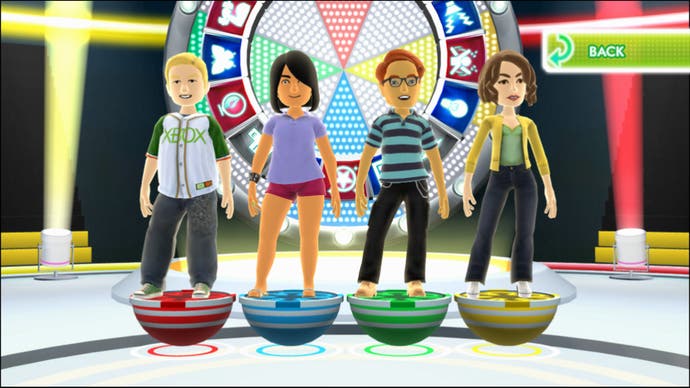Prof. Kawashima's Body and Brain Exercises
Fit or miss?
Every day you train, you mark the calendar by holding your hand out to grip an imaginary stamp. You can compare your own Brain Age with anybody else who has a profile stored on the console, but there's no Xbox Live integration at all, so there'll be no global Brain Age leaderboards.
In structure and design, then, it's very similar to the DS Brain Training games, but the presentation has more flavour to it. Avatar Kawashima has a talking lightbulb with legs called Watson for an assistant, who dances around on loading screens and recommends more lighthearted exercises to break up Kawashima's numbers and memorisation. For instance, there's a Pac Man-flavoured mini-game where you have to avoid ghosts with one hand whilst keeping your other hand trained on a piece of fruit.
Group brain-age tests can support 4 people taking turns at exercises – there are two-player and four-player simultaneous games too, but we weren't allowed to see them. Altogether there are 20 separate exercises, which seems a little light, though each has Beginner, Intermediate and Advanced variations that differ significantly from one another.
Strike a Pose, for instance, shows you up to six different poses at once and then gets you to recreate one of them from memory; Beginners just need to worry about arms, but Intermediate and Advanced involve the whole body.
"This particular title was developed with a large range of users in mind – we wanted to create something that would appeal to very young players, and to older players who aren't used to playing games, especially on the 360," Nishimoto says.

"So in order to appeal to these people, we had a large number of focus testers – roughly 100 – play the game. These people had very little – if any – experience with games at all, but they were really enjoying it."
I'm shown pictures of 50-plus Japanese ladies and gentlemen enjoying themselves in focus tests, but it's impossible to ignore that in Japan of all places, these are not people who own Xbox 360s. How does Nishimoto expect to sell the game to them if they don't have the console they'll need to play it on? Do Microsoft and Namco Bandai really believe that brain training is enough to persuade people in this demographic to make a £400-odd investment in a new games machine, a Kinect sensor and the game?
"Well, yes. That's exactly correct. They wouldn't normally have a 360," Nishimoto says. "But we're hoping that with the introduction of Kinect it will open up the market a bit more to non-traditional gamers who haven't played a game like this, but hopefully will show an interest now. We can expand the market a bit."
At least they're making the effort. The relatively high cost involved will probably prevent Xbox 360 and Kinect sales skyrocketing in Japan in the same way as DS sales did when Brain Training first picked up momentum, but you never know. The important thing is that Mind and Body Exercises is looking very playable, much more fun and considerably less contrived than many of the other Kinect games due at launch.
Prof. Kawashima's Body and Brain Exercises will launch alongside Kinect in Japan on 20th November, and in Europe early next year.
